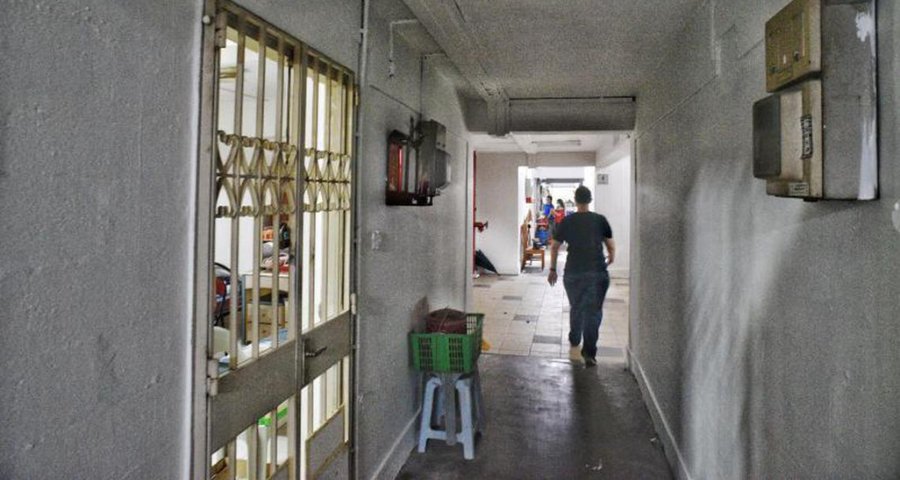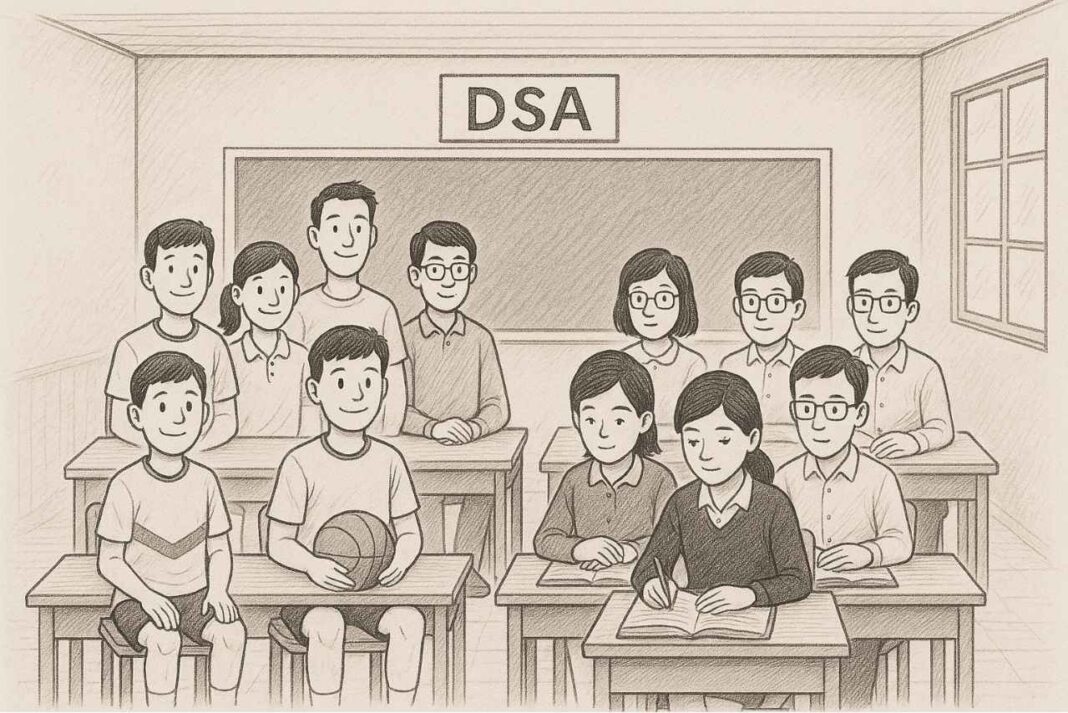In Singapore, few acronyms carry the emotional voltage of DSA. It promises a side door to the house of meritocracy, a door that, depending on where you stand, either lets in overlooked talent or lets some people skip the queue.
Yet, the expansion of the Direct School Admissions (DSA) scheme in 2019 allows for more students who excel in both academic and non-academic domains to have early admission in their preferred secondary school.
This has started a debate as to the real intention of the expanded DSA scheme. There are those that claim that it should strictly be for non-academic achievers as they are disadvantaged in taking the Primary School Leaving Examination (PSLE) (Davie, 2016).
Others argue that the expanded scheme should be open to both academic and non-academic domains given that it promotes a more holistic education (Tan, 2016). This paper would focus on the expanded DSA scheme, issues surrounding it, and arguments for and against upholding applications from both academic and non-academic domains.
What is the expanded DSA Scheme of 2019?
The expansion of the DSA scheme is aimed at promoting a well-balanced education by creating more opportunities for students to access appropriate programmes that can further develop their talents and interests (Baharudin, 2017). The expansion of the DSA scheme has resulted in various changes.
First, allowable allocation for non-integrated programme slots for DSA applications in secondary schools has now been increased to 20 per cent (Cheng, 2017).
Second, there would be changes in the selection process as schools will stop the use general ability tests. Instead, they are to use other tools such as auditions, interviews and practical examinations to evaluate talent (Mukhtar, 2017).
Lastly, the Ministry of Education will create a centralised online platform to simplify the application process (Ng, 2017). These changes, taken together, should give better access to schools and programs that can further develop unique competencies.
Issues Surrounding the Expanded DSA
One of the biggest criticisms about the DSA scheme is how it has evolved into an alternative route for academically competent students to get into premier schools (Davie, 2017). It seems like there are some schools that admit DSA scheme candidates mostly on the basis of academic competence, thereby getting a huge proportion of possible slots (Davie, 2017).
Moreover, given that only 60 per cent of students who acquired slots through the DSA scheme live in Housing Board Flats, compared to the 81 per cent of Singaporeans who reside in Housing Board flats, there have been issues about how the DSA scheme inadvertently becomes a program for the rich (Cheng, 2017).

These shows how the DSA scheme has significantly deviated from its original intention of providing opportunities for non-academic achievers. Turning a system that was intended to favour non-academic achievers into something against them further highlights the positive bias towards academically-competent students. The expansion of the DSA scheme becomes a way for the government to institutionalize its stand against this practice.
Arguments against Upholding the Current Expanded DSA Scheme
There are those that do not agree with allowing academically competent students to apply for the DSA scheme. The argument mostly highlights how the expanded DSA scheme was meant to give opportunities for students whose competencies are in the non-academic domain, much like sports, drama, or arts (Davie, 2016).
Academically competent students, more especially those from the Gifted Education Programme (GEP), would most likely get into their preferred schools with just their PSLE scores (Davie, 2016). The school system already puts these students at an advantage, and allowing them to take part in the DSA scheme is providing them another route to get into their preferred schools (Davie, 2016).
Moreover, the expanded DSA scheme was meant to nurture talents beyond academics, including students with academic competencies would not remove the focus parents and students have in academics (Baharudin & Tan, 2017).
Arguments for Upholding the Current Expanded DSA Scheme
On the contrary, there are those that seem to agree with the inclusion of academically competent students in the expanded DSA scheme. Given that GEP students still have to undergo the same selection process, they do not seem to have the upper hand in the expanded DSA scheme (Tan, 2016).
Moreover, GEP students comprise only a 18 per cent of accepted students under the DSA scheme (Tan, 2016). This doesn’t seem to undermine the chances of students that excel in the non-academic domain to get DSA slots. Another main argument questions the fundamental assumption that GEP students do well in the PSLE (Zhao, 2016).
As the GEP selection test was created to measure different types of intellectual talent, it does not necessarily measure academic performance (Zhao, 2016). Because of this, the assumption that GEP students would automatically get good PSLE scores is not necessarily true.
Thus, GEP students, similar to students that excel in non-academic domains, might actually need the DSA scheme to get into their preferred school. By including academically competent students in the DSA scheme, the Ministry of Education is further strengthening its goal of providing for a more holistic education.
Conclusion
Overall, the Ministry of Education’s expanded DSA scheme does seem to be well-intended. It is a way for the government to give opportunities to students that excel in either academic or non-academic domains.
By increasing the chances of students that excel in non-academic domains to get into their choice schools, it provides for an opportunity for them to increase access to better programs that can develop their current talents. By including applications for academically competent students, it further promotes the idea of holistic education.
Arguments against including academically competent students in the expanded DSA scheme does seem to make sense; however, given that GEP students comprise only 18 per cent of accepted students in the DSA scheme, it doesn’t seem to have a significant negative impact. Those arguments might only be applicable in some cases, but it doesn’t seem to hold for the majority.
The expanded DSA scheme does seem to uphold what it was intended to do. Although there can be improvements, especially on the school’s selection process, the current situation doesn’t seem to merit a change in the current expanded DSA scheme.
References:
Baharudin, H. (2017, March 8). Changes to DSA: Academic ability tests to be scrapped. The New Paper. Retrieved from http://www.tnp.sg/news/singapore/changes-dsa-academic-ability-tests-be-scrapped
Baharudin, H. & Tan, Adeline (2017, March 8). Expansion of DSA shows ‘strong message’: Parents, principals. The New Paper. Retrieved from: http://www.tnp.sg/news/singapore/expansion-dsa-shows-strong-message-parents-principals
Cheng, K. (2017, March 17). DSA revisions laudable, but challenge lies in transparency. Today Online. Retrieved from http://www.todayonline.com/daily-focus/education/dsa-revisions-laudable-challenge-lies-transparency
Davie, S. (2016, March 31). Schools, stop the ‘kiasu’ practice of using DSA to ‘chope’ bright kids. The Straits Times. Retreived from http://www.straitstimes.com/opinion/schools-stop-the-kiasu-practice-of-using-dsa-to-chope-bright-kids
Ng, C. (2017, March 7). Speed by Minister Ng Chee Meng for MOE (Schools) at the Committee of Supply Debate. Retrieved from https://www.gov.sg/microsites/budget2017/press-room/news/content/speech-by-minister-ng-chee-meng-for-moe-schools-at-the-committee-of-supply-debate
Mokhtar, F. (2017, March 7). Direct School Admission exercise cap raised to 20% for all schools: MOE. Today Online. Retrieved from http://www.todayonline.com/singapore/direct-school-admission-exercise-cap-raised-20-all-schools-moe
Tan, W. (2016, April 8). Don’t shut bright kids out of DSA. The Straits Times. Retrieved from http://www.straitstimes.com/forum/letters-in-print/dont-shut-bright-kids-out-of-dsa?login=true
Yang, C. (2017, March 7). Parliament: DSA scheme for pupils to enter Secondary 1 directly to be expanded. The Straits Times. Retrieved from http://www.straitstimes.com/politics/parliament-dsa-scheme-for-pupils-to-enter-secondary-1-directly-to-be-expanded
Zhao, J. (2016, April 21). A gifted child may not be academically talented. The Straits Times. Retrieved from http://www.straitstimes.com/forum/letters-on-the-web/a-gifted-child-may-not-be-academically-talented?login=true

